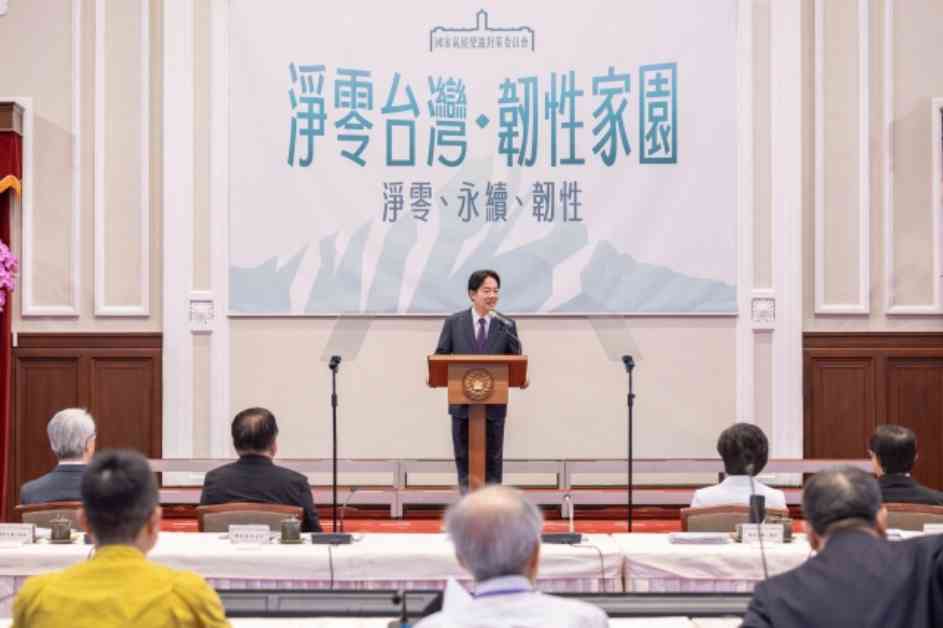Taiwan’s Climate Action: A Global Opportunity
Taiwan’s commitment to climate action is a testament to its proactive approach to addressing one of the most pressing issues of our time. Despite not being a member of the United Nations Framework Convention on Climate Change (UNFCCC), Taiwan has voluntarily submitted its nationally determined commitments for over a decade. In a significant move in 2023, the Tsai administration enshrined Taiwan’s 2050 net zero target into law. Additionally, the Ministry of Economic Affairs announced a target for 20% of energy generation to come from renewable sources by 2025.
The Importance of Taiwan’s Energy Transition on the Global Stage
Taiwan’s energy transition holds vital importance in the global efforts to decarbonize technology supply chains, particularly due to the significance of the Taiwanese semiconductor industry. As Taiwan heavily relies on imports of natural gas and coal, reducing its dependence on fossil fuels is not only an environmental imperative but also a matter of national security, given its vulnerability to naval blockades. Taiwan has a dual role to play in climate change mitigation and adaptation, as its per capita CO2 emissions are more than double that of the UK, and the island is already experiencing the impacts of the climate crisis, from disrupted typhoon cycles to rising sea levels.
Motivations Behind Taiwan’s Voluntary Alignment with International Climate Regime
Taiwan’s voluntary alignment with the international climate regime can be attributed to its desire to gain international support and recognition. By strategically linking international climate change politics to its political aims, Taiwan seeks to enhance its international legitimacy. Taiwan’s climate diplomacy efforts aim to position the country as a responsible eco-citizen and strengthen its relationships with the global community. Since the Chen Shui-bian administration, successive Taiwanese governments have leveraged the issue of climate change to advocate for greater UN participation. Taiwan’s climate diplomacy extends beyond state-level engagement, utilizing a polycentric strategy that involves a wide range of actors and methods to engage with the international community on climate issues.
President Lai’s Continued Focus on Climate Diplomacy
President Lai has signaled his intent to continue utilizing climate issues as a key strand of diplomatic relationships. By emphasizing climate cooperation with Europe, President Lai aims to showcase Taiwan’s willingness to engage in global issues such as climate change. This proactive approach underscores Taiwan’s commitment to climate action and its recognition of the importance of international collaboration in addressing climate challenges.
Challenges and Opportunities in Taiwan’s Climate Diplomacy Efforts
Despite Taiwan’s impressive climate commitments, its governance has been criticized for being insufficient to translate these commitments into tangible action. Taiwan’s climate policies have been labeled as “gesture policies” that lack effective implementation mechanisms. While Taiwan has made strides in areas such as offshore wind energy, there are concerns about policy shortcomings that could hinder the country’s progress in meeting its climate goals. Additionally, Taiwan’s proposed carbon tax has been criticized for being too low to significantly impact emissions.
A Renewed Focus on Effective Climate Governance
To enhance its international recognition and participation in the climate space, Taiwan must focus on effective climate governance. By prioritizing tangible results over symbolic gestures, Taiwan can strengthen its climate diplomacy efforts and demonstrate its commitment to addressing climate change. Taiwan’s success in issue-based diplomacy, such as promoting LGBT rights and healthcare excellence, highlights the potential for leveraging climate action to enhance its international standing.
Differentiating Taiwan’s Climate Leadership in a Global Context
As China positions itself as a climate leader, Taiwan faces challenges in gaining recognition in the climate space. By differentiating itself through innovative approaches to climate diplomacy, Taiwan can highlight its strengths and contributions to global climate action. Focusing on areas such as health-related impacts of climate change, decarbonizing tech supply chains, democratic climate policymaking, climate justice, and Indigenous knowledge integration can set Taiwan apart in the international climate arena.
Conclusion
Taiwan’s climate action presents an opportunity for the country to showcase its leadership and commitment to addressing climate change on the global stage. By prioritizing effective climate governance, leveraging successful issue-based diplomacy strategies, and differentiating itself through innovative approaches, Taiwan can enhance its international recognition and contribute meaningfully to global climate efforts. As Taiwan continues to navigate its complex international position, climate action emerges as a key avenue for driving progress and highlighting Taiwan’s strengths in the fight against climate change.












